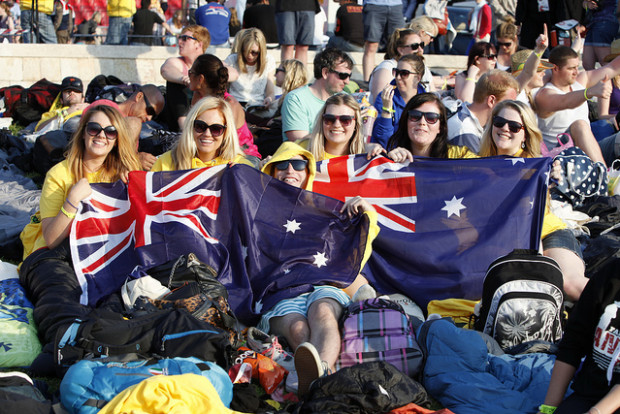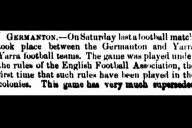“Could you imagine Bruce McAvaney saying that?”
“No, I couldn’t,” I said in response to my brother’s semi-rhetorical question about the senior AFL commentator.
The sacking of SBS soccer reporter Scott McIntyre last month for his series of tweets condemning the mythologising of the Anzac legend raised a tinderbox of issues related to freedom of speech and nationalism.
Among these issues are the obligation of the employee to their employer in regard to representations on social media; the responsibility of media organisations to allow journalists to air unpopular views; and the influence of government on publicly funded media outlets.
McIntyre has now lodged an appeal with the Fair Work Commission against SBS on the grounds of discrimination, claiming his former employer failed to follow due process in his sacking.
There has of course also been a vigorous debate about the accuracy of McIntyre’s claims about the Anzacs.
The debate about the veracity of McIntyre’s claims quickly polarised into the set views of Left and Right interpretations of history, the type of which have been recognisable and largely unchanged for decades. There is little common ground in these debates because the ideological fundamentals that underpin each side are set in black and white, providing the perfect fodder for the Spy vs. Spy style of sniping that has become the modus operandi of many on social media.
But somewhere in the middle, in the fog of Twitter war, were those historians who recognised broad truths in McIntyre’s claims, even if the SBS journalist had stated them in a clumsy manner.
Writing for The Conversation, Professor Philip Dwyer, the director of the Centre for the History of Violence, School of Humanities and Social Science at University of Newcastle, combed through the now infamous tweets and concluded that McIntyre had been “sacrificed on the altar of populist outrage”.
The response to McIntyre’s tweets is a demonstration that the popular perception of Anzac is completely out of step with the historical reality – but his remarks are also timely. We should not forget that war is never a one-sided affair in which our boys are squeaky-clean heroes and their boys murdering, raping villains.
Writing for The Guardian, sportswriter Geoff Lemon summed it up well when he cut through the historical niceties to reveal the naked lunch on the end of McIntyre’s fork:
Opprobrium didn’t pour down on McIntyre out of respect for historical veracity. It was because he’d disturbed a broadly accepted idea of sanctity on a day that has been secularly consecrated. Without a whole lot to believe in, many of us have deemed Anzac Day holy.
Another aspect of the McIntyre affair, which has perhaps understandably escaped the scrutiny of mainstream media, is the nexus between his – now former – position as a football reporter with SBS, specifically The World Game, and the nature of his deemed offence, which was to have expressed blasphemous views about a cardinal tenet of Australian identity and nationalism.
McIntyre’s position as a football journalist and his tirade against the Anzac legend adds a new plot point to the story of the sport’s difficult relationship with national identity. It feeds back into the narrative of the sport as a foreign and ultimately un-Australian pastime, and one which, according to its long line of critics down the years, harbors any number of corrupting influences on the nation’s youth.
To invoke the oft-quoted Johnny Warren adage, it’s a sport for “sheilas, wogs and poofters”. And as we all know, there were no sheilas, wogs or poofters among the Anzacs.
Soccer. The Grand perpetuator of violence & mindless tribalism. The warmongers aperitif… Oh, the irony. Scott Mcintyre @mcintinhos #auspol
— amagickeagle999 (@amagickeagle999) April 27, 2015
What is it with Soccer journalists? http://t.co/WwfCLgPku5 — Martin Lynch (@mj_lynch) April 27, 2015
McIntyre was a respected if fairly low-key member of The World Game team who specialised in Asian football. Even though he was “only a sports reporter” (in Media Watch host Paul Barry’s words), McIntyre’s professional beat probably exposed him to a wider range of political and cultural views than most domestic journalists.
His worldview has no doubt been informed by his exposure to the many cultures and people that can be found playing the world’s most popular sport, which seeped into his work as a journalist.
Unlike Barry’s blithe dismissal of McIntyre’s beat, in her piece for New Matilda dissecting the Twitter firestorm surrounding the McIntyre affair, academic and journalist Wendy Bacon acknowledged his work covering football around the world as worthy of note, especially by “right wing vigilantes on Twitter”.
Bacon cites McIntyre’s series of features on football in Palestine as an example of his broader take on sports journalism: “like many good sport journalists, he builds political and social analysis into reports.”
McIntyre’s miskick was to apply this lens to a topic in which he had no publicly recognised or established credentials and which was dear to the heart of many Australians. His tweets were so jarring, so blunt, that on first reading I questioned whether he had been either drunk or had his account hacked. But what his tweets revealed was an essentially humanist take on the Anzac legend, a critical position that transcended the consensus patriotism which had developed around all things Anzac in the past 20 years or so. These were the thoughts of an internationalist, someone with a cosmopolitan view of the world.
In fact, McIntyre’s cosmopolitan outlook as a journalist echoes some of the opening lines of that most hallowed gospel of Australian football, mentioned earlier, Johnny Warren’s Sheilas, Wogs and Poofters:
Throughout my life, football has come to mean so much to me. It has made me more aware, it has awakened the world citizen inside me and it has alerted me to what the sport is capable of achieving for my own wonderful country, Australia. Football has been the vehicle as well as the window for that awakening.
While there are certainly voices of dissent within the ranks of the other football codes and, indeed, other sports, it’s really only the world game that provides the scope and depth of engagement with such a vast range of cultures. It’s a sport that allows the outsider to go almost anywhere and strike up a conversation, and those conversations can often reveal a great amount about a culture or society – both the good and the bad. This in turn opens the opportunity to learn, understand and empathise with those from different cultures and with different views.
Of course this is dependent on the person: if you are closed-minded and bigoted you’ll use the evidence presented to confirm your prejudices; but in McIntyre’s case – and without knowing him personally – it presented an opportunity for him to become a global citizen and to understand that there are usually many different sides to a story.
Through his work covering the world game, McIntyre had taken on a cosmopolitan view, one which was ultimately expressed in his tweets, where he placed the universal suffering of war victims above the nationalist rhetoric of Anzac Day.
The cosmopolitan worldview can sit uneasily with that pillar of post-war Australian society: multiculturalism. While the doctrine of multiculturalism has facilitated the nation-building of a relatively harmonious society in Australia, easing New Australians into the ‘she’ll be right, mate’ lifestyle of their adopted homeland, the ethical demands of cosmopolitanism present a different sort of challenge because it asks us to put the moral considerations of common humanity first, above the considerations of national allegiance.
The common complaint against the cosmopolitan ideal is that it ends in abstraction; our roots ripped from the motherland soil, we’re left to wander the globe like dilettante adventurers, not truly engaged in any community. An extension of this thinking is that the cosmopolitan becomes disdainful of his compatriots, a traitor to his people. (This view of cosmopolitanism is at the base of the anti-Semitic rhetoric that was perpetuated in post-war Soviet Union, characterising Jews as “rootless cosmopolitans”.)
Australia’s Race Discrimination Commissioner Tim Soutphommasane outlined a mild variation on this line of argument in an article for The Australian, in which he compared the merits of multiculturalism and cosmopolitanism and noted the shortcomings of the latter: “One can end up loving abstract humanity while loathing one’s own neighbours and country.”
This is partly what McIntyre was accused of doing in calling out some of the grim realities at the heart of the Anzac story. He became a traitor to the cause, an elitist who was hopelessly out of touch with the sentiments of his fellow Australians.
The worldly nature of football has often put it at odds with the strongly parochial, insular strands of Australian society. It’s a tension that is at the heart of the ambivalent relationship between Australia and “our wicked, foreign game”, to quote Australian football historian Roy Hay. Despite the game having deep roots in this country, chronicled by the likes of Hay, as well as having strong connections to Australia’s Anzac history, as evidenced by historian Ian Syson’s body of work on the subject, there have been long-running suspicions about its Australian-ness.
This suspicion was compounded by the role post-war immigrants played in the growth of the game in Australia, wrapping the sport up even more in the flags of foreign influence for many observers. Often it was a matter of ‘leave your foreign squabbles at home, and while you’re at it, keep your wogball there too’. Anglo Australia had its own games, thank you very much. It was easier to integrate and assimilate migrants when they played by Aussie Rules, so to speak.
An especially disappointing aspect of the McIntyre affair was the swift condemnation he received from two of his most senior colleagues at The World Game. Almost as if by Pavlovian command, both Les Murray and Craig Foster tweeted in no uncertain terms that they disagreed with McIntyre’s views, and in Murray’s words, those views were “an utter disgrace”.
Whether the quick move to distance themselves from their colleague of many years came purely out of patriotic pride and respect for the Anzacs or it stemmed from the political and budgetary pressure that SBS and its football programs have been under in recent times (there have been rumours of SBS cutting back drastically on its football coverage, including A-League), the abandonment of McIntyre smacked of expedience.
Murray’s disavowal was made even sadder by the fact that as a young Hungarian refugee he had escaped the evils of political repression and oppressive Groupthink in a Communist state. Though, in fairness to Murray, it might also be asking too much to expect those who have fled oppressive political regimes to necessarily champion the rights of free speech in their adopted country.
For the record: In my view today’s tweets on Anzacs by @mcintinhos, if properly attributed, are an utter disgrace. His own, his own alone.
— Les Murray (@lesmurraySBS) April 25, 2015
The McIntyre affair once again illustrates the unique position football has as a force in bringing the world home. More so than any other sport or even perhaps cultural activity, football exposes its participants (fans, players, administrators, et al) to the myriad social, cultural and political realities of the globe. In an age of dizzying globalisation, it provides a vehicle for shared experiences and an exchange of ideas.
Not all football people, journalists included, are like Scott McIntyre; there are more than enough parochial, racist, narrow-minded football people out there. But many who enter into the communion of the roundball find that through a shared love of the sport, a common bond can be forged with those we think we have little in common with, or even those we are told should be our enemy. It’s from this point of awakening that we then perhaps become better citizens of the world.
Main image from the Department of Veterans’ Affairs Flickr account.
















